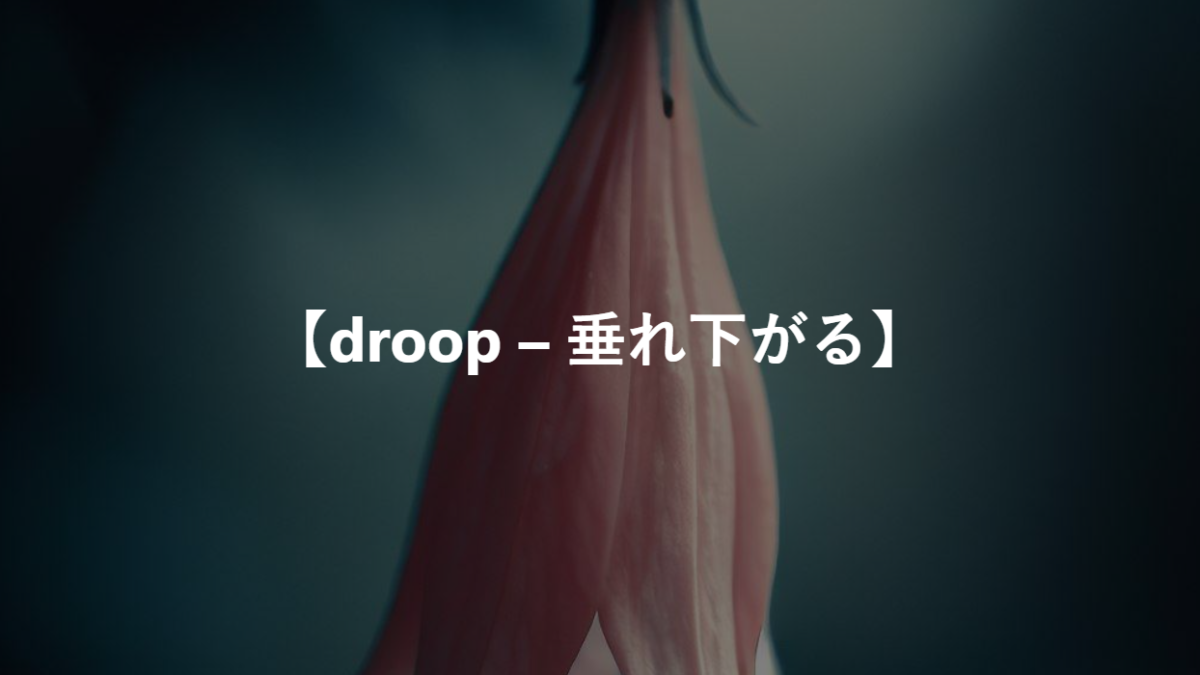語源・類義語・反対語・例文
【Droop – 垂れ下がる】という単語の語源とか由来を知っていますか?
「Droop」という単語は、古英語の「drūpan」や古ノルド語の「drúpa」に由来しており、いずれも「垂れ下がる」や「落ち込む」という意味を持っています。これらの単語は、物体が下向きに垂れ下がる動きや様子を表すのに使われていました。時間が経つにつれ、「droop」は植物、体の一部、あるいは人の精神状態が下向きに垂れる様子を示すのに一般的に使用されるようになりました。この単語は、力なく下に垂れる自然な動きや姿勢を表現するのに用いられています。
The word “droop” originates from the Old English “drūpan” or Old Norse “drúpa,” both meaning to droop or to sag. These words were used to describe the action or state of an object hanging downwards. Over time, “droop” has become commonly used to depict the downward sagging of plants, parts of the body, or even a person’s spirits. The word is employed to express the natural movement or posture of hanging limply downwards.
類義語・反対語は?
類義語:
- Sag – たるむ: 物体が中央から下に向かって垂れ下がる様子。
- Dangle – ぶら下がる: 何かが上部から垂れ下がって揺れる動き。
- Hang – 吊るす: 上から下に向かって垂れ下がる動作。
- Limp – だらりとする: 力なくぶら下がる状態。
- Slink – しなだれる: ゆっくりと垂れ下がる動き。
- Slouch – うなだれる: 特に人の姿勢が前方に垂れ下がる様子。
- Wilt – しおれる: 植物が水分不足などで下向きに垂れる状態。
反対語:
- Erect – 直立する: 物体や人がまっすぐに立っている状態。
- Stiffen – 硬直する: 柔軟性がなくなり、動かない固い状態。
- Perk up – 元気になる: 特に植物がしおれた後、元気に立ち上がること。
- Tighten – 引き締める: ゆるんでいたものがきつくなる動作。
- Uplift – 持ち上げる: 物体や心情が上向きに動かされること。
- Straighten – 真っ直ぐにする: 曲がっていたものをまっすぐな状態に戻す。
- Strengthen – 強化する: 力をつけて強くすること。
この単語に似た単語で間違いやすい単語はありますか?
「Droop」と混同されやすい単語としては、特に直接的なものはありませんが、音が似ている「drool」(よだれをたらす)や意味が近い「sag」(たるむ、下がる)などが考えられます。これらの単語は、音が似ているために聞き間違えたり、意味が似ているために文脈によっては間違えやすい場合があります。しかし、「droop」と「drool」は意味が大きく異なるため、文脈を正しく理解して使い分けることが重要です。
There aren’t specifically words that are frequently confused with “droop,” but words such as “drool” (to dribble saliva) might be mistaken due to phonetic similarity, or “sag” (to sink or bend downward under weight) due to similarity in meaning. These words could be misunderstood due to their sound being similar or because their meanings are related. However, “droop” and “drool” differ significantly in meaning, so it is important to understand the context correctly to distinguish between them.
この単語を使った例文を5つほど教えてください。
The flowers in the vase began to droop after a few days without water.
(花瓶の中の花は数日間水を与えないでしばらくするとしおれ始めました。)
Her shoulders drooped in disappointment as she received the bad news.
(彼女は悪い知らせを受けて肩を落としました。)
The tree branches drooped under the weight of the heavy snow.
(木の枝は重い雪の重みで下がりました。)
The tired hiker’s backpack began to droop on his shoulders after a long day of hiking.
(疲れたハイカーは一日中ハイキングした後、バックパックが肩に垂れ下がり始めました。)
The old curtains had started to droop, giving the room a tired and neglected appearance.
(古いカーテンは垂れ下がり始め、部屋に疲れた印象と放置された雰囲気を与えていました。)
【droop – 垂れ下がる】のコロケーション
- Eyes droop – 目が垂れ下がる: 疲れや睡眠不足で、目が閉じそうになる様子を表します。
- Flowers droop – 花が垂れ下がる: 水不足や疲労により、花が元気をなくし、下向きに垂れる状態を指します。
- Shoulders droop – 肩が垂れ下がる: 落胆や疲れによって、肩が力なく下がることを表します。しばしば精神的な疲労や失望の様子を示すのに使われます。
- Leaves droop – 葉が垂れ下がる: 植物の葉が乾燥や病気によって元気を失い、下向きに垂れることを指します。
- Mouth droops – 口が垂れ下がる: 悲しみや失望により、口角が下がること。表情が落ち込んでいる状態を示します。
「Droop」という言葉は様々な文脈で使用され、いくつかの異なるフレーズで一般的に組み合わされます。ここでは、これらの一般的なコロケーションについて説明します。
「Eyes droop」は、誰かの目が閉じ始める状態、通常は疲労または睡眠不足によるものを描写します。この表現は、疲れが見える物理的な表現、つまりまぶたが重くなり始めて垂れ下がる状態を捉えます。
「Flowers droop」は、花が活力を失い、下向きに垂れ始める状態を指します。これは通常、脱水や疲労によるもので、植物に水が必要であるか、外部の条件の影響を受けてしおれたり生命がなく見えたりすることを記述するのに使用されます。
「Shoulders droop」は、失望や疲れが人の姿勢を通して反映される状態を示します。誰かの肩が前方および下方に垂れるとき、通常、敗北感、悲しみ、または疲れの兆候として捉えられます。これは、感情的または身体的な負担に対する身体的な反応を示しています。
「Leaves droop」は、「Flowers droop」と同様に植物の状態を指し、葉が堅さを失い始めてしなやかに垂れ下がること、しばしば水不足または病気によるものです。この用語は、植物の健康を記述するのに使用され、手入れが必要であることを示しています。
「Mouth droops」は、特に口の端が下がるような、誰かの顔の表情の変化を捉えます。これは、悲しみ、失望、または不幸の兆候となることがあります。この物理的な変化は、しばしば人のネガティブな感情状態を反映しています。
これらのコロケーションは、「droop」が物理的な状態だけでなく、心理的な状態や感情を表現するのにも使用されることを示しており、詳細な状況や感情を伝えるための多用途な言葉であることを示しています。
The word “droop” is used in various contexts, leading to several different phrases, known as collocations, where it is commonly paired. Here is an explanation of some of these common collocations:
“Eyes droop” describes a situation where someone’s eyes are starting to close, usually due to tiredness or lack of sleep. This expression captures the physical manifestation of fatigue, where the eyelids become heavy and begin to fall.
“Flowers droop” refers to the condition where flowers lose their vitality and start to hang downwards, typically because of dehydration or exhaustion. This phrase is often used to describe plants that need water or have been affected by external conditions, causing them to appear wilted or lifeless.
“Shoulders droop” indicates a state of disappointment or weariness, reflected through a person’s posture. When someone’s shoulders fall forward and down, it usually signals a sense of defeat, sadness, or tiredness, illustrating a physical response to emotional or physical strain.
“Leaves droop” points to a similar condition in plants as “flowers droop,” where leaves lose their stiffness and begin to hang limply, often due to lack of water or disease. This term is used to describe the health of a plant and can indicate when it requires care.
“Mouth droops” captures the change in someone’s facial expression, particularly the downturn of the mouth, which can be a sign of sadness, disappointment, or unhappiness. This physical change often reflects a person’s negative emotional state.
These collocations show that “droop” can be used not only to describe physical conditions but also to express psychological states or emotions, making it a versatile word in conveying detailed situations or feelings.
文法問題: “droop” (垂れ下がる)
- 動詞の形:
The flowers in the vase _________ in the heat.
(A) drooped
(B) droop
(C) drooping
(D) droopingly
解答と解説:
(A) drooped 空欄には動詞が必要です。文脈から過去時制が適切なので、drooped (過去形) が正解です。
– - 現在分詞形:
The _________ branches of the willow tree swayed gently in the breeze.
(A) droop
(B) drooped
(C) drooping
(D) droopingly
解答と解説:
(C) drooping 空欄には名詞 branches を修飾する形容詞が必要です。drooping は「垂れ下がった」という意味の現在分詞形の形容詞です。
– - 類義語:
The _________ shoulders of the tired worker suggested exhaustion.
(A) drooped
(B) slumped
(C) sagged
(D) all of the above
解答と解説:
(D) all of the above drooped, slumped, sagged はいずれも「垂れ下がる」という意味で、この文脈ではすべて適切です。
– - 反意語:
The plants _________ towards the sunlight.
(A) drooped
(B) reached
(C) stretched
(D) all of the above
解答と解説:
(D) all of the above 文脈から、空欄には droop の反意語が入ることがわかります。reached, stretched は「手を伸ばす」「伸びる」という意味なので、適切です。
– - 誤文訂正:
The droopingly eyelids of the sleepy child slowly closed.
解答と解説:
droopingly eyelids → drooping eyelids 空欄には名詞 eyelids を修飾する形容詞が必要です。droopingly は副詞なので、形容詞 drooping に修正する必要があります。

